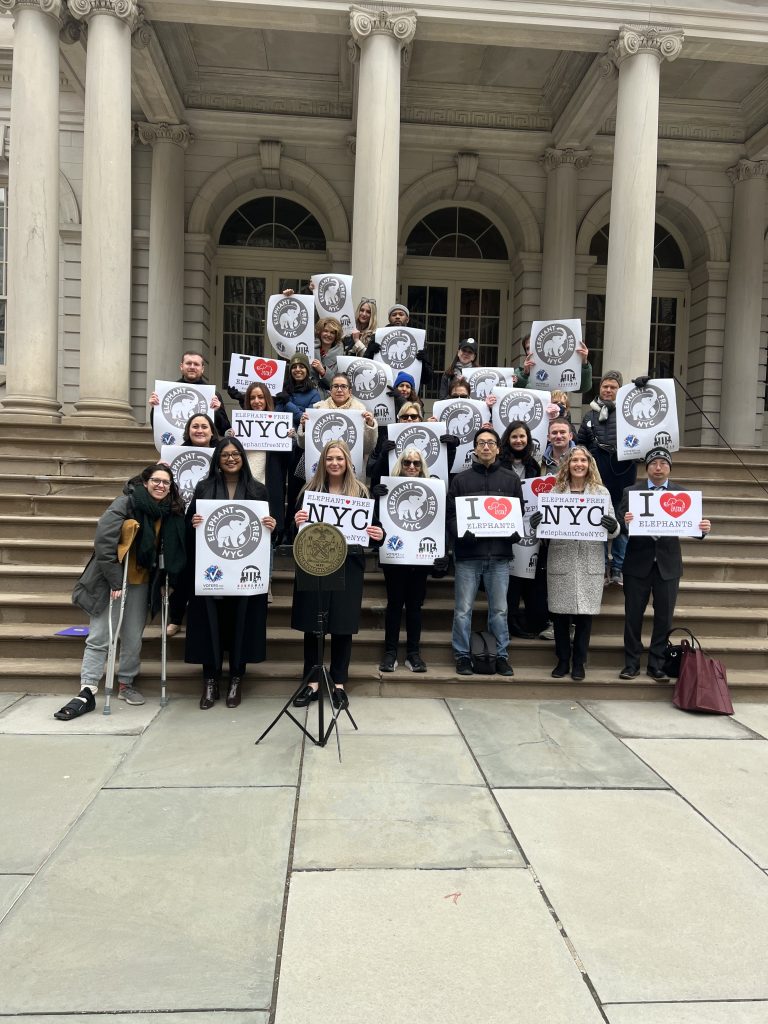Overview
New York City Council bill, Intro 213 would ban the keeping of elephants in captivity in the city. Introduced by Council Member Shahana Hanif, who represents New York City’s 39th district, this bill would require that any entity in the city holding elephants captive relocate them to a facility that can meet their complex physical and psychological needs, unless they meet very strict exceptions laid out in the bill.
This legislation would directly affect the Bronx Zoo. For nearly 50 years, two elephants have been languishing at the zoo, which is managed by the Wildlife Conservation Society. Happy and Patty, wild-born Asian elephants who were captured and brought to the United States to be put on display, are held alone, without the necessary companionship of other elephants. In addition to the loss of their freedom at a young age, both have lost long-time companions, and for Patty, also a son. They are confined to a small enclosure that contains a divided one-acre outdoor yard, barren corrals, and a holding facility. In the winter months, including days like today, when it’s too cold for them to be outside, they are held captive in an industrial cement structure that is lined with windowless, barred cages. Each elephant only has access to one portion of a divided outside yard at a time. They are constantly inundated with the sounds of the city, whether it be cars, trucks, planes, and of course the monorail that rides above them every day for half of the year.

Our position
The NhRP strongly supports Intro 213, which will put an end to over two centuries of elephant suffering in New York City.
Elephants are majestic beings. They are cognitively complex individuals with extraordinary emotional intelligence. They are autonomous, self-aware, and empathetic. They have a rich network of social relationships through which they cooperate and build coalitions. They understand the physical competence and emotional state of others. They engage in intentional communication, including vocalizations to share knowledge and information with others in a manner similar to humans.
Through scientific studies and observations we have also learned what elephants need to thrive and how captivity causes them immense physical and psychological harm. Elephants are meant to move great distances, with free elephants walking over 20 miles a day. Elephants in small spaces with little mental and physical stimulation often exhibit abnormal stereotypic behavior, such as rocking and swaying.
Elephants held captive in environments that do not allow them to exercise their autonomy are plagued by a host of physical and psychological ailments that are not observed among their free-living counterparts. Captive elephants suffer from obesity, arthritis, foot problems and reproductive and psychological disorders—and die at a younger age. They suffer from neural deterioration, brain damage, and death of critical parts of their brain.
At the Bronx Zoo, Happy and Patty have no true freedom of choice. Their days are controlled by zoo employees. They are without the companionship of other elephants. Everything about the life the Bronx Zoo is forcing them to lead is known to cause enormous suffering in elephants. There is another life possible for Happy and Patty, and this bill would make it a reality. This bill will also ensure that elephants will never again be held captive in environments known to cause them harm.